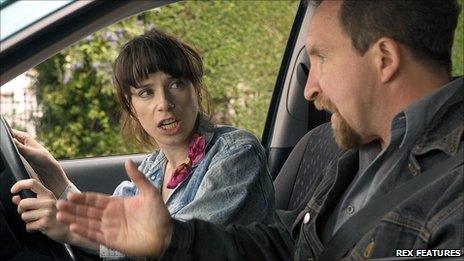Who would be a driving examiner?
- Published

If instructing is a stressful job, what about examining?
The driving test is changing, but the hazards, fears and bizarre complaints faced by examiners are sure to stay the same. How do they cope with this thankless job?
Right, are you comfortable? Hands at 10-to-two on the wheel, sitting upright, knees below hips? Have you adjusted your rear-view mirror and fastened your seatbelt?
Then we'll begin.
Few civilians can confront so much tension, anxiety and death-defying peril on a daily basis as driving examiners.
They may be recalled with a shudder by many of us as impassive authority figures on whose whim we can be freed from our L-plates or condemned to another expensive round of lessons.
But spare a thought for those who spend their days in passenger seats next to drivers who are anxious, inexperienced and, occasionally, downright dangerous.
They are, for the first time, conducting a new driving test intended to focus on "independent driving" rather than following step-by-step instructions.
But a series of freedom of information requests by the ┤¾¤¾┤½├¢ reveals the arbitrary and sometimes downright odd protests from disgruntled test candidates over examiners.
In 2009, according to the Driving Standards Agency (DSA), there were some 1,889 complaints about the conduct of examiners, the conduct of tests and disputed decisions, of which just 51 were upheld.
Those which were rejected included "Candidate crashed during test - claims examiner distracted", "Says examiner took her on busy roads during rush hour, which was unfair", and "Says examiner has invented serious fault".
Another, which was not upheld either, came from a test candidate who insisted that an "emergency stop was conducted 'without warning'" - misunderstanding, perhaps, the nature and purpose of an emergency stop.
Having to gently let down highly wound-up individuals who have paid handsomely for both test and lesson with the news that they have failed might sound like the most precarious element of the job.
But according to Gerry Brennan, 55, a former examiner at Edinburgh test centre who now runs a driving school in Glasgow, it was not the risk of failed candidates lashing out that he dreaded most.
Instead, his greatest fear was the damage they could inflict accidentally.
"There are some people who are just not ready for the test," he recalls, the memories still all too fresh. "The worst thing is when they're not aware of how bad they are.
"It can be really nerve-wracking if you aren't in a car with dual control brakes - you have to grab the steering wheel if you're heading for the pavement or oncoming traffic. You've got to be alert all the time - I had more than a few narrow escapes.
"But I never had much hostility from candidates - if they'd done something seriously wrong they usually knew about it and accepted it."
Such hazards aside, the job does have its consolations. Typically, a 35-hour week, made up of around eight tests a day, will at least offer the opportunity to see the world passing by rather than trapping oneself behind a desk - even if those prime three-point-turn locations must become very familiar.
The ┤¾¤¾┤½├¢'s Emma Simpson: "Oh dear, I've just gone into Tesco"
Examiners - of whom there are around 2,000 in the UK - are normally qualified instructors, but they must undergo an intensive four-to-six-week DSA residential course before they can sit in judgement.
One evangelist for the role is the DSA's deputy chief driving examiner, Sandra Dodson, 58, who first qualified for the role in 1990.
"There used to be a lot of examiners who were ex-military and ex-police," she says. "When I took my test in 1971 I was instructed: 'Lead the way way to your ve-hi-cle' instead of someone saying 'Hello, how are you, let's go to your car, then.'
"Nowadays, you have to be good with people - you have to be able to put them at their ease, you have to display tolerance, you have to display calmness.
"It's no good for anyone if the candidate is all wound up - that's when you start having to slam on the brakes for them."
Nonetheless, the profession is one that is unlikely ever to inspire much affection from those who endure the trauma of a test.
The motoring journalist and former Top Gear presenter Quentin Willson believes the low esteem in which they are held by the general public is indicative of how the British fail to take road safety seriously.
"Driving examiners have a status that's the same as, or maybe just above, that of traffic wardens, and that's clearly wrong," he says.
"It's easy to vilify them, but I think they are much more sinned against than sinners.
"Their job is a production line, a sausage factory, when in fact they really should be given much more time to spend with these kids who are about to be let loose on our roads."
It may be easy to resent these individuals who are so synonymous with a process most of us find traumatic. But when I tap the dashboard, I want you to stop.
Additional reporting by Julia Ross